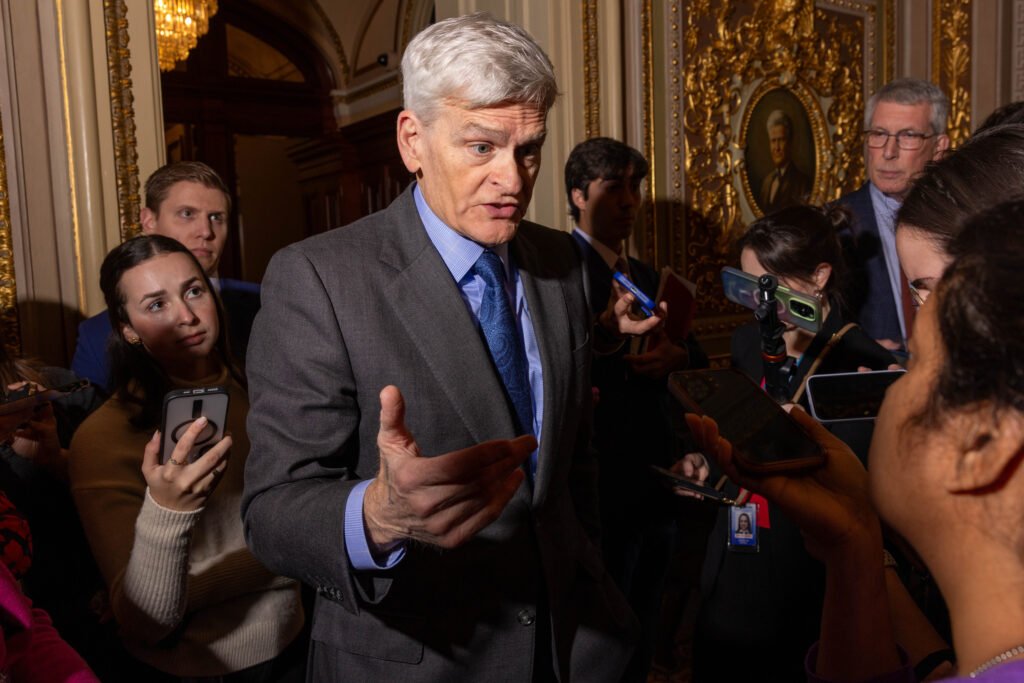
Senate Democrats are projecting optimism they’ll be able to strike a bipartisan deal to extend Obamacare subsidies in the coming weeks. But Senate Republicans have their own plans.
Republicans appear to be quickly pivoting from the debate around Affordable Care Act tax credits to developing their own health policy agenda, with many conservatives now feeling like they have the blessing of President Donald Trump to pursue alternative solutions to spiking insurance premiums. Among the ideas they’re considering is the creation of new health savings accounts.
The shutdown-ending deal the Senate passed Monday night lacked an extension of the Obamacare subsidies, which expire at the end of the year, and Democrats instead secured a commitment for a vote on the credits next month. Democrats who brokered that government funding compromise are insisting they’ll be able to make headway on negotiations over the tax credits and are looking to land the bipartisan health care compromise by the second week of December.
But the fractured conversations among Republicans are promising to bog down negotiations as Obamacare beneficiaries begin to lock in their rates for the year ahead. Lawmakers on both sides of the aisle are starting to privately admit it’s likely too late to avert a major premium hike for millions of Americans in 2026.
“Obviously our folks have an interest in having some of our own ideas out there,” Senate Majority Leader John Thune said Monday when asked whether Republicans would generate a counteroffer on the subsidies or collaborate with Democrats. “There’s some goodwill on this issue. We’ll see if something lands.”
Thune told reporters that Senate Finance Chair Mike Crapo of Idaho, Senate HELP Chair Bill Cassidy of Louisiana, Senate GOP Steering Committee Chair Rick Scott of Florida and Finance Committee member Roger Marshall of Kansas will be among those spearheading talks with Democrats on a potential Obamacare compromise.
On the Democratic side, Senate Minority Leader Chuck Schumer is expected to run point on health care talks, but other Democrats including Sens. Jeanne Shaheen of New Hampshire and Senate Finance ranking member Ron Wyden of Oregon will be involved, according to a person granted anonymity to share internal caucus dynamics.
Shaheen, fellow New Hampshire Democratic Sen. Maggie Hassan and independent Sen. Angus King of Maine brokered the shutdown-ending deal Schumer opposed for not including an ironclad promise to extend the credits.
GOP members of Senate Finance, which has jurisdiction over the ACA, huddled Monday afternoon to broach their own ideas, though they were tight-lipped afterward about what proposals were discussed.
The gathering came after Cassidy and Scott called on Republicans to ditch the Obamacare tax credits altogether and fund tax-advantaged health savings accounts for individuals to pay directly for care.
Sen. Thom Tillis, a retiring Finance Committee Republican, said in an interview Monday that it would probably be smart to extend current policy for a year because of the encroaching deadline and then implement changes the following year.
“If you really want to bend the curve on health care, then you gotta have a serious discussion about what works and what’s not working in Obamacare and fix it,” he said.
Senate Republicans appeared Monday to be largely split over whether to pursue the option endorsed by Tillis or plow ahead on a more ambitious conservative overhaul of the nation’s health care system.
Cassidy has been exhorting his colleagues to back a new idea to put money into employer-sponsored accounts that would allow individuals to set aside pre-tax dollars for medical expenses.
Trump over the weekend gave a boost to the concept when he said in a Truth Social post that “the Hundreds of Billions of Dollars currently being sent to money sucking Insurance Companies… [should] be sent to the people.”
“If we extend the enhanced premium tax credits, $26 billion go to insurance companies,” Cassidy told reporters Monday. “If we put it into a flexible spending account, 100 percent is going to the person who’s making a decision of where to spend their dollars.”
Cassidy added that he’s spoken to Democrats about the idea who “support it” and “want to know more.”
A challenge for Democrats in the coming weeks will be to train Republicans’ focus on the task of finding a compromise around the ACA credits, with the clock ticking to reach a deal.
“We have to write a version that is good for our values that helps people, but also is designed to get some Republican votes,” said Sen. Tim Kaine of Virginia, who was among the eight members of the Senate Democratic Caucus who voted to reopen the government Monday evening.
But even if Senate Democrats can cobble together a deal that attracts enough votes in their chamber, Speaker Mike Johnson remains non-commital about putting an Obamacare bill on the floor in the House.
Some Congressional Republicans who say they are committed to drafting an extension of the ACA subsidies are advocating for conservative modifications, including lowering the income cap that determines eligibility and restricting the subsidies from covering abortions. An income limit could get bipartisan buy-in, but abortion restrictions are likely a nonstarter for most Democrats.
Some House Republicans who see political peril in letting the subsidies lapse say privately that there’s enough support on their side of the aisle to help Democrats force a vote on the subsidies through a so-called discharge petition. But whether Republicans would actually forge ahead in bucking House leadership remains to be seen.
“I know that there are Republicans who want to fix this, but there’s no resolve, as far as I can tell, to take this up in the House if we’re able to pass it in the Senate,” said Sen. Tammy Baldwin (D-Wis.), who voted against the bill to reopen the government Monday night. “And that’s why I couldn’t agree to that package.”
Jennifer Scholtes and Jordain Carney contributed to this report.

